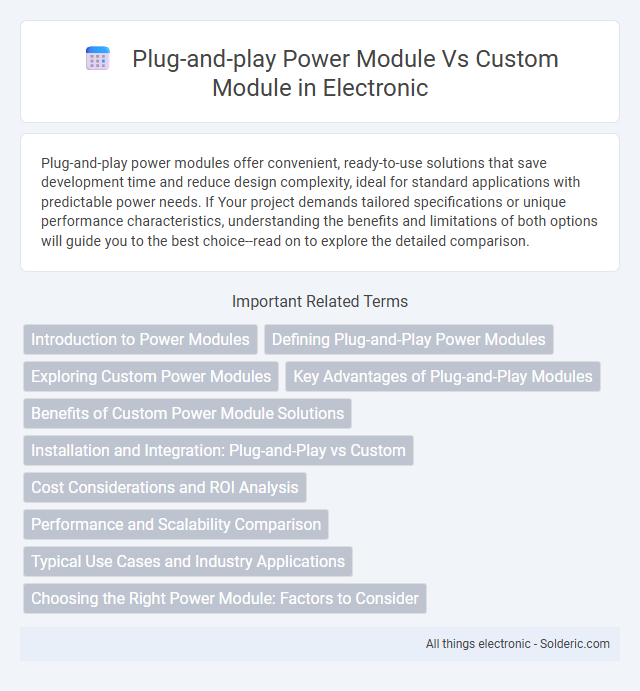Plug-and-play power modules offer convenient, ready-to-use solutions that save development time and reduce design complexity, ideal for standard applications with predictable power needs. If Your project demands tailored specifications or unique performance characteristics, understanding the benefits and limitations of both options will guide you to the best choice--read on to explore the detailed comparison.
Comparison Table
| Feature | Plug-and-Play Power Module | Custom Power Module |
|---|---|---|
| Design Time | Minimal, ready-made design | Extended, tailored design |
| Cost | Lower upfront cost | Higher initial investment |
| Flexibility | Limited customization | Fully customizable |
| Integration | Easy integration, standardized | Requires design and testing |
| Performance Optimization | General use optimization | Optimized for specific needs |
| Production Volume | Ideal for low to medium volume | Cost-effective at high volume |
| Technical Support | Manufacturer support available | In-house or third-party support |
| Time to Market | Fast deployment | Longer development cycle |
Introduction to Power Modules
Plug-and-play power modules offer standardized, pre-engineered solutions designed for quick integration and reduced development time in various electronic applications. Custom power modules provide tailor-made designs optimized for specific performance requirements, thermal management, and spatial constraints unique to a project. Selecting between plug-and-play and custom modules depends on balancing factors such as time-to-market, cost, and the level of design flexibility required.
Defining Plug-and-Play Power Modules
Plug-and-play power modules are pre-engineered, self-contained units designed for immediate integration into electronic systems without requiring extensive customization. These modules offer standardized voltage and current outputs, enhanced reliability, and reduced development time compared to custom power modules tailored specifically to unique application requirements. Your choice depends on whether you prioritize rapid deployment and simplicity or need specialized specifications only achievable through custom design.
Exploring Custom Power Modules
Custom power modules offer tailored voltage, current, and form factor specifications specifically designed to meet unique application requirements, providing enhanced flexibility and efficiency compared to standard plug-and-play modules. These modules enable integration of specialized components such as thermal management systems, EMI filters, and advanced protection circuits, optimizing overall system performance and reliability. The design process of custom power modules also allows for better scalability and improved compatibility with specific hardware constraints, making them ideal for complex industrial, medical, and aerospace applications.
Key Advantages of Plug-and-Play Modules
Plug-and-play power modules offer significant time savings by eliminating complex design and integration processes, allowing immediate deployment in various electronic systems. These modules ensure reliable performance with built-in protections and standardized interfaces, reducing the risk of errors and enhancing system stability. Their modularity and scalability support flexible upgrades and maintenance, making them ideal for rapid development cycles and diverse application requirements.
Benefits of Custom Power Module Solutions
Custom power module solutions offer tailored voltage and current specifications that precisely match specific application requirements, enhancing system efficiency and reliability. These modules enable optimized thermal management and space utilization, contributing to longer device lifespan and reduced cooling costs. Integration flexibility supports unique form factors and advanced control features, providing superior performance compared to standard plug-and-play power modules.
Installation and Integration: Plug-and-Play vs Custom
Plug-and-play power modules offer streamlined installation with pre-configured interfaces, enabling rapid integration into existing systems without extensive technical modifications. Custom power modules require detailed engineering, increasing installation time and potential compatibility checks to ensure seamless integration with specific hardware architectures. The choice between plug-and-play and custom modules significantly impacts project timelines and resource allocation for system deployment.
Cost Considerations and ROI Analysis
Plug-and-play power modules offer lower upfront costs and faster deployment compared to custom modules, reducing initial capital expenditure and minimizing design time. Custom power modules often involve higher development and engineering expenses but provide tailored efficiency and performance that can enhance long-term ROI through optimized energy use and reduced maintenance. Evaluating Your project's specific needs and lifecycle costs is crucial to determine whether immediate savings or long-term efficiency drives better financial returns.
Performance and Scalability Comparison
Plug-and-play power modules offer consistent performance with standardized specifications, enabling quick integration and reliable operation in various applications. Custom power modules provide tailored performance optimization and enhanced scalability by allowing adjustments specific to unique system requirements and power demands. While plug-and-play options excel in ease of deployment and predictable scalability, custom modules deliver superior efficiency and adaptability for complex, high-performance power management solutions.
Typical Use Cases and Industry Applications
Plug-and-play power modules are ideal for rapid prototyping, small-scale production, and industries such as consumer electronics, where time-to-market and ease of integration are critical. Custom power modules suit applications requiring tailored specifications, high efficiency, and reliability, frequently found in aerospace, automotive, and industrial automation sectors. Your choice depends on whether standardized solutions meet your design constraints or if bespoke modules better serve complex, high-performance requirements.
Choosing the Right Power Module: Factors to Consider
Selecting the right power module depends on factors such as design complexity, time-to-market, and customization needs. Plug-and-play power modules offer quick integration and proven reliability with standardized specifications, ideal for reducing development cycles. Custom modules provide tailored performance and efficiency, making them suitable for unique applications requiring specific voltage, current, or footprint requirements.
plug-and-play power module vs custom module Infographic

 solderic.com
solderic.com